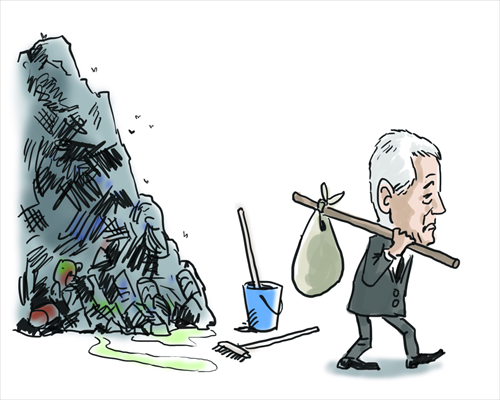HOME >> OP-ED
Hagel scapegoat for Obama’s dysfunctional security policy following elections
Source:Global Times Published: 2014-11-27 20:08:01

Illustration: Liu Rui/GT
US Defense Secretary Chuck Hagel submitted his resignation on Monday under pressure and will step down from the position as soon as a successor is picked, as the US is struggling to deal with a messy Middle East amid widespread suspicions about its waning capabilities.It is no surprise that President Barack Obama seeks a changeover in the leadership that oversees the national defense policy after the Democrats were swept by the Republicans in recent midterm elections. It indicates that the president feels a need to change the focus of a policy that is not working well.
What's unexpected is that such a shake-up comes so soon.
The 68-year-old defense secretary has not done well enough in the position that he took since February 2013, but the US failure in Europe and the Middle East is due primarily to the president and his team, for which Hagel is nevertheless blamed.
Being defense secretary is no easy job given its weight and sophisticated political skills as well as personal capability required.
As a moderate Republican, Hagel has been committed to carrying out the national security policy under the tight grip of Obama, but the ongoing chaos in the Middle East, particularly in Syria, Iraq and Afghanistan, suggests the policy hasn't worked well.
And it's notable that the Pentagon chief clashes with Obama's small group of aides and has never penetrated into it.
Last month, Hagel sent a memo to National Security Adviser Susan Rice, saying that Obama has to state more clearly in what way he wants to deal with Syrian President Bashar al-Assad. The letter reportedly angered the White House.
Obama is often criticized for heavily relying on a tight circle that includes Rice to make his foreign and national security policy, but a small team doesn't help with reasonable and efficient decision-making.
Members of the circle lack strategic thinking, wide vision and also experience, making Obama's foreign and national security policy obviously shortsighted, not well-planned and full of political calculations.
This forms a crucial defect for Obama, as no one in his administration can be called a prominent strategist like Henry Kissinger, who possesses strategic thinking and abundant knowledge of international politics.
Otherwise the Ukraine crisis wouldn't have turned out the way it has, with the US, the EU and Ukraine all being losers in the game.
With regard to this circle, even Secretary of State John Kerry hasn't made himself a complete insider. And in the aftermath of the midterm elections, Hagel's Republican identity may also play a part in his forced resignation, though the scale is unknown.
However, generally speaking, this is a good time to change the defense secretary. Obama is set to change the defense leadership for the sake of two years left in his rocky tenure, as Obama called it an "appropriate time for him to complete his service." Any postponement won't leave enough time for the successor to adapt to and perform the due responsibilities.
Hagel's resignation may signal that more departures are to come, which will be possibly from the National Security Council of the White House and the State Department at different levels.
Hagel's successor should be capable of dealing with national security issues, to be familiar with relevant government agencies, and to obtain the confidence of Obama and confirmation of Senate.
There are reportedly several possible replacements for the position, including Michele Flournoy and Ashton Carter, both of whom served in the Pentagon.
For such a crucial but difficult position, it takes time for Obama to pick a satisfactory chief, the fourth one during his presidency.
The article was compiled by Global Times reporter Sun Xiaobo based on an interview with Xin Qiang, deputy director of the Center for American Studies at Fudan University. sunxiaobo@globaltimes.com.cn
Posted in: Viewpoint